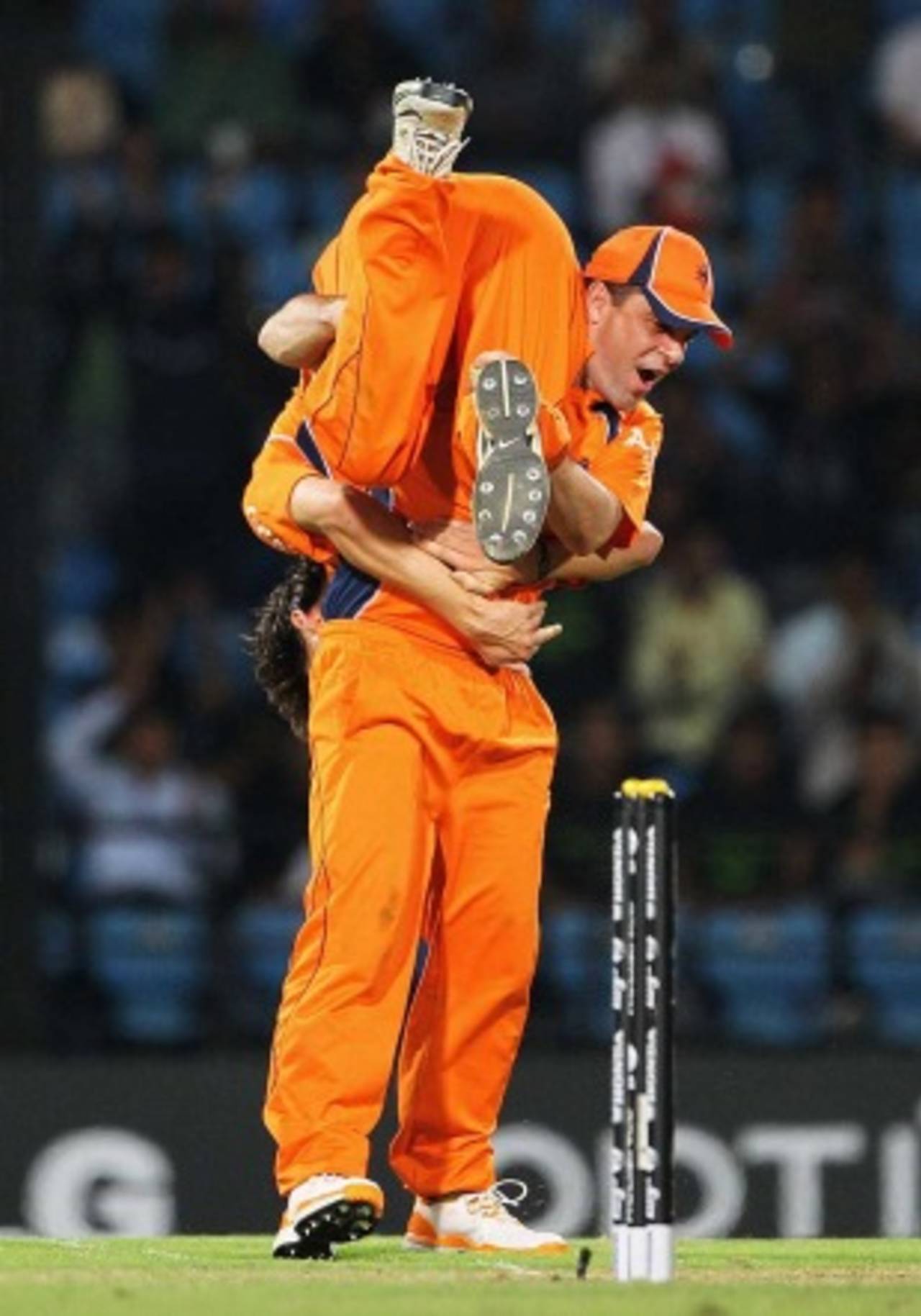Good things come to those who wait
Teams seem to be going back to the strategy of keeping wickets in hand to make a big splash at the end
Harsha Bhogle
25-Feb-2011

Pieter Seelaar and Peter Borren celebrate the wicket of Pietersen: amateur cricket at its most charming • Getty Images
It is still early days at this World Cup, and there will be phases when it will seem pretty tedious, but already a few trends are starting to manifest themselves. These are the sparring rounds before the big bouts come along, but teams are starting to show their cards a bit, and from that point of view it has been a nice beginning.
It might seem that we are going back to the days when teams kept wickets in hand and looked to score runs towards the end of the innings. Certainly we are past the phase when a couple of players were assigned the kamikaze role of going hell for leather at the top. The difference between the eighties and now, though, is that keeping wickets and playing safe in the first 15 means getting 75 runs rather than 45.
But the fact that teams are opting to keep wickets (we saw that with Australia and with Sri Lanka, and it has definitely become a pattern with Pakistan) is the first major effect of the third Powerplay. Teams now know that there are five very productive overs left and increasingly are using those to propel the innings along rather than merely finish it, which was the objective in the first place. In fact, I foresee a situation where teams will start taking the Powerplay earlier, around the 34th over, when a hard ball becomes available.
And since the pitches seem very good to bat on, teams know they can wait. There have been days when the pitch started changing character towards the end of the second innings, but that seems unlikely to happen here, so teams batting second can take the Powerplay with one less variable to encounter.
In our studio on ESPN Star Sports, Sourav Ganguly has been talking frequently of the importance of Nos. 5, 6 and 7, and you can see that with the good teams, who have all opted to go in with the extra batsman. Sri Lanka chose both Chamara Kapugedera and Thisara Perera; England went with Ravi Bopara as the sixth batsman, plus the wicketkeeper; Pakistan used Abdul Razzaq to bowl the new ball to accommodate six batsmen plus him and Shahid Afridi. This means that the part-timers, inevitably slow bowlers, will have an increasingly important role. Sri Lanka used Tillakaratne Dilshan and Thilan Samaraweera, England tried Kevin Pietersen, and Australia played Steven Smith and David Hussey in support of Jason Krejza. I hope young kids all over are becoming aware of the importance of having a second string to your bow.
Sadly the Associate nations have looked out of place. Kenya's fall has been particularly dramatic. The batting is too thin, the bowling ordinary and conceding 46 extras against Pakistan a luxury they couldn't afford. Soon they will be without Steve Tikolo and Thomas Odoyo, the last survivors of what was actually a pretty decent team, and then they may struggle to hold their own even among the next rung of cricket-playing nations.
Netherlands made an impact but that was largely because of the first-class players in their midst. Somehow the ICC has to find a way of ensuring that more teams, like the Dutch, have some experience around them. But on the evidence of the first five days, the ICC's decision to limit the number of teams seems to be the way to go. Having said that, it raises the question of what the objective of the World Cup is. A reward to the best of the next set of teams is a laudable objective, but it makes the first month tedious. If the idea is to showcase the modern game at its competitive best, then I'm afraid the other teams aren't making much of a point. Two qualifiers might be the way to go.
Amidst the one-sided encounters two performances stood out. Virender Sehwag's 175 showed what he can achieve if he bats long enough, and Ryan ten Doeschate's century against England was excellent to watch. And the most romantic moment came from the Dutch too: when Peter Seelaar had Kevin Pietersen caught at cover. There was a spontaneous eruption of joy and it was amateur cricket at its most charming. It put into perspective why we watch and play sport. Sadly I fear moments like those, few and far between, won't be enough to make a strong case for the smaller nations.
Harsha Bhogle is a commentator, television presenter and writer. His Twitter feed is here